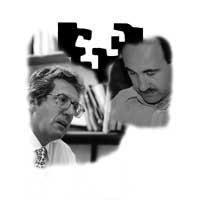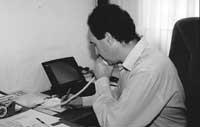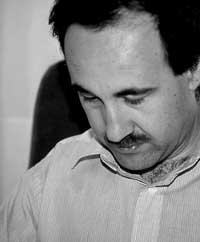Jesús Ugalde:

Jesús Ugalde:
Elhuyar: He works in the polymer science and technology department. Can you define your work in two words?
Jesús Ugalde: I am a chemist and a theorist, they are the two words that ask me, but that said the definition is quite short. In fact, just as the development of theories is a theoretical work, we also consider as a theoretical work the use of known theories to analyze problems of chemical importance. I explain what I am saying with the following example. We theoretically study the chemical clusters within solar panels. These chemical elements are organized very differently according to their composition, size, isomers, etc. In one way or another, the result, in our case the absorption capacity of solar energy, can be very different and, obviously, we should maximize that capacity. We get into it: we model these elements on the computer and try to predict the capabilities of each cluster. We work theoretically, but its practical application is clear, since today this distinction is not so simple, although it is clear that basic and applied research are very different.
Elh. : The jury that has decided to give him the Xabier Maria Munibe prize has valued, in addition to the excellence of the work done to date, his condition as a young researcher, which seems to indicate that his work will have a great orientation. How long is a researcher young?
J. U.: It seems that there are only young and old researchers and those around the age of 40 place us in the first group. It is true, on the other hand, that there are contests that use this type of criteria and that according to them have been fully successful in my case. In any case, youth can also be measured taking into account the years I have been working; I studied in Valladolid and arrived at the Faculty of Chemistry of San Sebastian in 1982, but on the occasion of the thesis I spent about two years studying abroad. Then, on the occasion of the postdoctoral courses, I spent a lot of time out, studying there and here, but it is only 12 years when I am working here.
Elh. : The faculty is 23 years old, so at that time you would see things changing...

J. U.: No doubt. When I started working at the school we were in the San Sebastian neighborhood of Altza. Neither office, nor table, nor computer... not at a distance! After a few months I got an old computer that didn't deserve the name of PC, which didn't even have a hard drive. I had the poor computer for four months working day and night doing some calculations and in the end I managed to give it the number I was looking for, so I got the material I needed to publish my first article here! When we came to the campus of Ibaeta my first task was to address this problem of infrastructures, and for this it was fundamental the enormous support that they offered us in the Calculation Center of the Faculty of Computer Science; thanks to the system that today would seem to us of the last century, in the end we managed to make our entire faculty connected through the network; the economic support that provided us the Provincial Council of Gipuzkoa great investment. The university itself put its network on us, so we had our own system.
Elh. : Uses the plural constantly, gives prominence to the group...
J. U.: We also had a good job forming a team! Cecilia Sarasola was the first and then the others, especially the students. Thanks to this, our group soon moved abroad, because we also looked abroad for students who were willing to work with us. For this reason, at the international level we form an important network of collaborators that, fortunately, we continue to maintain.
Elh. : The Faculty of Chemistry has received in a very short time two important awards that have ensured that the entire work team is owed the honors that are being received. What has the Faculty of Chemistry, Jesus?
J. U.: I don't think it's written anywhere what I see here and I think that from there comes to our faculty what Peter and I have highlighted. And the faculty allows people to work, it does not put obstacles. In all human groups there are clashes, but we do not waste time between us in vain and whenever possible, we help each other. That doesn't happen in many places, but like here, when you find that environment, when they offer you the emotional support needed for the job, it's also seen in the results. This practice has much to do with the youth of the faculty. Here things are done like that. To be able to do the thesis, for example, I went to Canada and during those two years the professors of my department replaced my teaching hours; it is not a punctual effort, what you do in a moment, but the confidence that we trust each other in a conscious and continuous way, which is what, obviously, is the way to advance all of us. We have all had to be pioneers in many areas and we all know how tiring it is in those principles.
Elh. : With these advantages, what are the main barriers to your work?

J. U.: Bureaucracy is the main obstacle that we are currently trapped in the short chain. Our work is financed by public money, so we have to do many laps to be able to cope with all the roles we need. The time we lose in paperwork is often impressive. With this I do not mean that this use of public money is not justified, but should be facilitated as far as possible, making the work of all more effective. It is a matter of measures, no doubt. In all departments there is a person in charge of administrative work, that is the rule, but in our case the work is huge for a single employee, since the departments are not equal. Only our department has to manage 130 million pesetas a year and we have four other faculty departments that are in very high figures! We need more people for administrative tasks.
Elh. : There is a lot of talk about financing problems, usually to the detriment. What is your situation?
J. U.: It is a great temptation for us, not to answer such a question, but we have to understand that we have more than one team to manage more than one faculty, the situation could be much more serene, but we are not so bad. When I say this, I am thinking of other centers that do not have the possibilities that we have. The universities that feed directly from the Madrid administration are much worse than us, in our case the Basque institutions have been able to make quite courageous decisions. For example, we have the Provincial Council of Gipuzkoa and I would like to say that it really has a behavior worthy of removing the txapela; in no case have to promote basic research, and if they did not, we could not accuse them of anything, but they do, showing great political courage and ingenuity.
Elh. : For several years he also took over the Erasmus program. How do you value this experience of international leap?
J. U.: For me it was incredible to know him closely and the results that are being obtained today with the new name of Socrates are very good. First of all with the Erasmus program and lately with Socrates, we have seen that our level is irreverent. At first it was a European program, in which a university from each of the Member States of the European Union participated, and therefore we sent students abroad and received students from outside. I took care of the program and did not come a suspense! Subsequently the program has spread to the US and Canada and the results are being very similar. For us it was very important and especially interesting for our students; thanks to this program they realized that more of Irun there were young people with similar concerns. Participation has always been very good and we have all learned a lot. It is essential that you have that value to enrich yourself.
Buletina
Bidali zure helbide elektronikoa eta jaso asteroko buletina zure sarrera-ontzian











